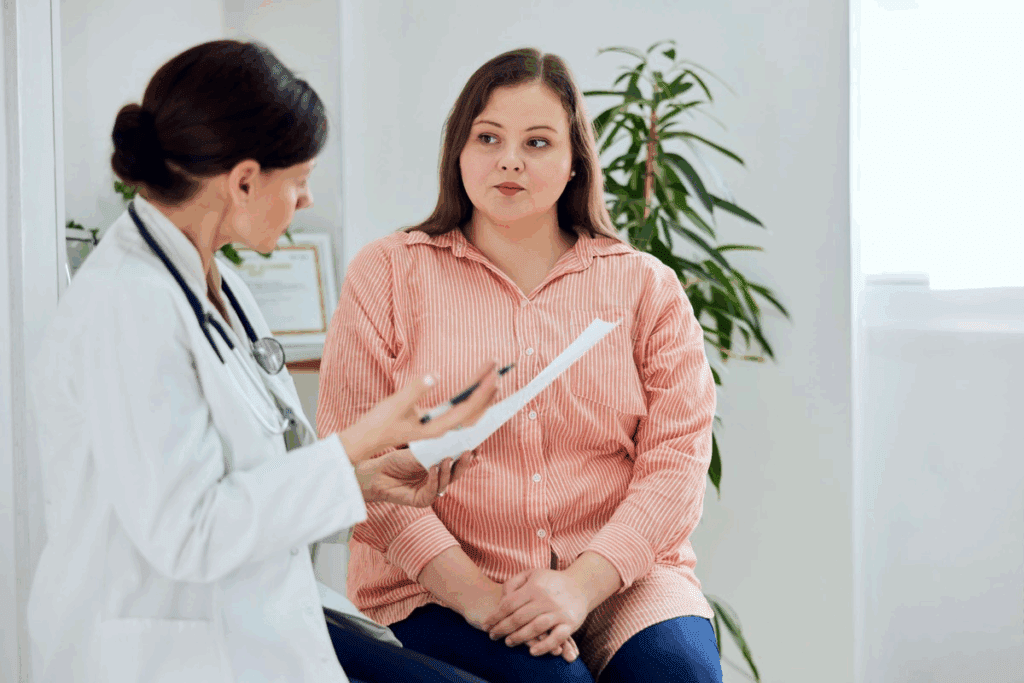Last Updated on November 26, 2025 by Bilal Hasdemir

Colorectal cancer often starts without symptoms. This makes regular screenings key for early detection and prevention.Find out how often you need to how often do you need to get a colonoscopy
The colonoscopy screening frequency varies based on risk level and medical history. Most people at average risk should get a colonoscopy every 10 years, starting at age 45. Knowing your risk factors helps determine the best screening schedule for you.

Colonoscopy is a key method for preventing and finding colorectal cancer early. It lets doctors see the whole colon and take out any suspicious spots during the same visit.
This test is very important. It helps find polyps that could turn into cancer before they do. Regular colonoscopies can greatly reduce the chance of dying from colorectal cancer by catching it early.
A colonoscopy uses a flexible tube with a camera and light to look inside the colon. It’s important for finding and stopping colorectal cancer early.
Early detection is key to beating colorectal cancer. Colonoscopy screenings can spot polyps that could turn into cancer, so they can be taken out before they’re a big problem.
Colonoscopy is a big help in preventing cancer by removing polyps that could become cancerous. This step can stop colorectal cancer from happening.
Colonoscopies play a big role in cancer prevention. They can find cancer early and also stop it from happening by removing polyps that could turn into cancer.
Regular screenings are a must for people at average risk starting at age 45, as guidelines now say. This age was lowered from 50 to 45 because more young people are getting colorectal cancer.

The American medical community has updated its colonoscopy guidelines. Now, the first screening for colorectal cancer should start at 45, not 50. This change is because more young adults are getting colorectal cancer. It’s a move to find problems early, when they’re easier to treat.
The age for starting screenings was lowered to 45 due to rising cancer rates in the young. Research shows a big jump in colorectal cancer among those under 50. This new rule is to catch cancer early and prevent it.
People at average risk should start screenings at 45. But, if you have a family history or other risk factors, you might need to start sooner or get screened more often.
For those at average risk, you should get a colonoscopy every 10 years after a normal screening at 45. This gap is because polyps grow slowly and can turn cancerous. It lets you go 10 years without worrying about cancer.
But, if your first colonoscopy finds polyps, you might need to come back sooner than 10 years. Your doctor will tell you when to schedule your next screening.
Knowing your risk for colorectal cancer is key to setting up a colonoscopy schedule that’s right for you. Your risk is shaped by your genes, lifestyle, and the environment around you.
People at average risk have no history of colorectal cancer or polyps. They also don’t have a family history of the disease. And they haven’t had inflammatory bowel disease or known genetic syndromes.
Moderate risk comes from having a family member with colorectal cancer or polyps. This relative should have been diagnosed at 60 or older. Other factors include a history of other cancers or certain genetic syndromes.
The table below shows what moderate risk means for how often you should get a colonoscopy:
| Risk Factor | Description | Recommended Colonoscopy Frequency |
| Family History | First-degree relative with colorectal cancer or adenomatous polyps diagnosed at age 60 or older | Every 10 years, starting at age 40 or 10 years before the relative’s diagnosis age |
| Personal History of Other Cancers | History of certain other cancers that may increase colorectal cancer risk | Discuss with healthcare provider; may require more frequent screenings |
High-risk groups include those with a history of colorectal cancer, polyps, or inflammatory bowel disease. People with known genetic syndromes like Lynch syndrome or Familial Adenomatous Polyposis (FAP) are also at high risk.
Key high-risk factors include:
Those in high-risk groups often need more frequent colonoscopies. The exact schedule depends on your specific risk factors. Always talk to your healthcare provider about what’s best for you.
For those at average risk of colorectal cancer, screening guidelines offer a clear path to early detection and prevention. These guidelines help healthcare providers and patients make smart choices about screening.
The recommended screening for average-risk people is a colonoscopy every 10 years, starting at 45. This is because colorectal cancer grows slowly, and regular screenings can catch and remove precancerous polyps.
Benefits of the 10-Year Interval: This schedule helps find colorectal cancer early, when it’s easier to treat. It also lets doctors remove polyps before they turn cancerous, which could prevent cancer.
There are other screening choices for average-risk folks. Stool tests like the fecal immunochemical test (FIT) and multitarget stool DNA testing (sDNA-FIT) can be done more often than colonoscopies. They add extra screening between colonoscopies.
| Screening Method | Frequency | Description |
| Colonoscopy | Every 10 years | Visual examination of the colon and rectum |
| Fecal Immunochemical Test (FIT) | Annually | Detects blood in the stool |
| Multitarget Stool DNA Testing (sDNA-FIT) | Every 3 years | Detects DNA changes and blood in the stool |
By following these guidelines, average-risk individuals can lower their risk of colorectal cancer. It’s key to talk to a healthcare provider to find the best screening plan for your health and risk factors.
The right time for a colonoscopy depends on family history, past polyp findings, and lifestyle. Knowing these details helps set the best screening schedule.
A family history of colon cancer is a big risk factor. If a close relative had colon cancer, you might need to start screenings early and do them more often.
Key considerations include:
Found polyps during a colonoscopy can change how often you need screenings. The size, number, and type of polyps matter a lot.
For example:
Some lifestyle choices can up your risk for colon cancer. These include eating a lot of red and processed meats, not moving much, being overweight, and smoking.
Lifestyle adjustments and their impact on screening:
Healthcare providers can tailor a screening plan for those at moderate risk. This helps catch colon cancer early and prevent it.
Some people need more colonoscopies because of health conditions. This is true for those with inflammatory bowel disease, genetic syndromes, or a history of colorectal cancer. Knowing how often to get a colonoscopy is key to catching cancer early.
People with inflammatory bowel disease (IBD) face a higher risk of colorectal cancer. This risk grows if they have had the disease for a long time, have extensive colitis, or come from a family with a history of colorectal cancer.
Surveillance colonoscopy is a must for IBD patients. It helps find cancer or dysplasia early. The first colonoscopy is recommended 8 to 10 years after diagnosis. After that, how often you need one depends on your risk and what the previous colonoscopies found.
People with certain genetic syndromes, like Lynch syndrome or familial adenomatous polyposis (FAP), are at a higher risk of colorectal cancer. Their screening needs are more aggressive.
For example, those with Lynch syndrome should start colonoscopy screening at 20 to 25 years old. They need to do this 2 to 5 years before the earliest age of colorectal cancer in their family. They should have colonoscopies every 1 to 2 years.
“The presence of a genetic syndrome significantly alters the screening paradigm for colorectal cancer, necessitating earlier and more frequent surveillance.”
People who have had colorectal cancer are at risk of it coming back. They need regular checks.
Guidelines say that those who have had colorectal cancer should have a colonoscopy within a year after surgery. Or after they clear their colon before surgery. How often they need one after that depends on what the colonoscopy finds.
| Time Frame | Colonoscopy Frequency |
| First follow-up | 1 year after surgery or after clearing the colon |
| If normal | Every 3 years |
| If adenomas detected | More frequently, based on polyp characteristics |
While most people should get a colonoscopy every 10 years, some need it more often. This is true for those at higher risk. For some, it might be every 5 years or even more, based on their risk factors and past colonoscopies.
It’s important for those at high risk to talk to their doctors about how often they should get a colonoscopy. Their family history, genetic predisposition, and past colonoscopy results all matter in deciding the best schedule.
Knowing how long a colonoscopy lasts is important for staying healthy. A colonoscopy is good for a while, but how long depends on your risk and what the test finds.
For most people, a colonoscopy is needed every 10 years. This is because most colon cancers grow slowly over years. The 10-year interval helps catch and remove these growths before they turn cancerous.
Research shows this 10-year gap is safe for those at average risk. Studies found the chance of getting colon cancer within 10 years after a normal colonoscopy is very low. This reassuring data backs up the current screening guidelines.
What a colonoscopy finds can change when you need to have another one. For example, finding and removing polyps might mean you need a colonoscopy sooner.
Starting screenings at 45 is a big step. The first colonoscopy’s results are key in deciding how often you’ll need to go back. If it’s normal, you’ll likely need another in 10 years, at 55.
But, if you find polyps or other issues, your schedule might change. For example, those with high-risk polyps might need to go every 3 years.
“The key to effective colorectal cancer prevention is not just the initial screening, but the follow-up and adherence to recommended screening intervals based on individual risk factors.”
It’s important to know how long a colonoscopy lasts and stick to the recommended schedule. By following these guidelines and adjusting based on your risk and test results, you can lower your chance of getting colon cancer.
As we age, our need for colonoscopy screenings can change. This is due to different health factors. We will look at what affects how often we should get a colonoscopy.
Age is key in figuring out how often to get a colonoscopy. Older people face a higher risk of colorectal cancer. But, they might also have other health issues that affect screening decisions.
Stopping routine colonoscopy screenings depends on several things. These include overall health, life expectancy, and past screening results. Usually, guidelines say to stop when life expectancy is less than 10 years.
There’s no strict limit to the number of colonoscopies if they’re medically needed. But, each case is decided based on benefits and risks.
Recovery time after a colonoscopy can affect how often you’ll need future screenings. If recovery is hard or complicated, it might mean you need to rethink future screenings.
| Factor | Consideration | Impact on Screening Frequency |
| Age | Increasing age | May increase frequency due to higher risk |
| Health Status | Presence of other health issues | May decrease frequency if life expectancy < 10 years |
| Previous Screening Results | Findings of previous colonoscopies | Determines need for more frequent screenings |
| Recovery Time | Complications during recovery | May decrease frequency if complications are significant |
Finding the right time for a colonoscopy is key to preventing and catching colorectal cancer early. Knowing your risk factors and health history helps you make a personalized colonoscopy schedule that fits you.
Doing a risk assessment is important to figure out how often you need a colonoscopy. Your family history, past polyp findings, and lifestyle affect your risk.
Talking to your doctor is essential to create a screening plan just for you. This way, you can take care of your colorectal health proactively.
Having a personalized colonoscopy schedule helps you keep up with your health. It lowers the chance of colorectal cancer and catches problems early.
If you’re at average risk, you should get a colonoscopy every 10 years. This starts when you turn 45.
Several things can change how often you need a colonoscopy. These include your family history, any polyps found before, your lifestyle, and if you’ve had colorectal cancer.
If your family has had colorectal cancer, your doctor might want you to get screened more often. You might start earlier than 45.
Certain groups are at higher risk. These include people with inflammatory bowel disease, genetic syndromes, or a history of colorectal cancer.
If you have inflammatory bowel disease, your doctor might suggest more frequent screenings. This could be every 1-3 years.
Whether to stop screenings depends on your health and how long you might live. Talk to your doctor about it.
A colonoscopy can be effective for 10 years or more. This depends on the results and your risk factors.
Between colonoscopies, you can try stool tests. These include fecal immunochemical tests (FIT) or multi-target stool DNA tests.
There’s no strict limit on colonoscopies. But, your doctor will decide based on your health needs.
Recovery time can affect how often you get screened. Your doctor will tell you when it’s safe to have another one.
After 45, how often you get a colonoscopy depends on your risk and screening results. Talk to your doctor about it.
Yes, your lifestyle can affect how often you need a colonoscopy. This includes your diet, smoking, and exercise level. Discuss this with your doctor.
Garruti, G., et al. (2018). Cholecystectomy: a way forward and back to metabolic disease? Current Opinion in Lipidology, 29(3), 189-195. Retrieved from
Subscribe to our e-newsletter to stay informed about the latest innovations in the world of health and exclusive offers!